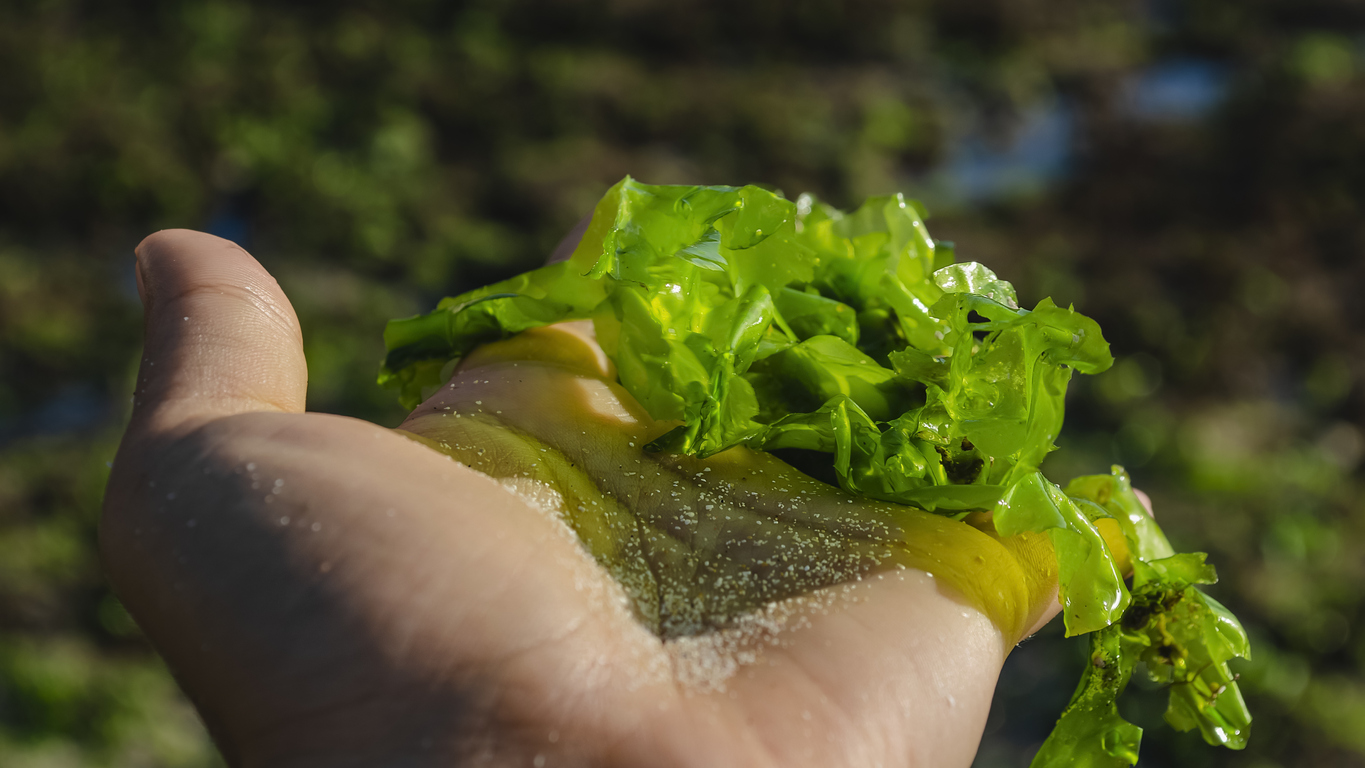
Dive into the depths of one of nutrition’s best-kept secrets – sea moss. Amidst the surging wave of superfoods, this oceanic gem stands tall, boasting an array of health benefits you won’t want to miss. Read on to unravel the many benefits of sea moss, delving into its remarkable potential to fortify the immune system, enhance digestion, bestow radiant skin, and provide crucial support for the thyroid. Not only will we cover the benefits of sea moss, but we’ll also cover the science and trace back its historical roots in traditional remedies. You will also discover practical tips for harnessing the power of this ocean treasure.

What is sea moss?
Found in the Northern Atlantic coasts of America and Europe, sea moss (Chondrus crispus), also known as Irish moss, is a red seaweed rich in carrageenan. Carrageenan is a polysaccharide popularly used as a stabilizer or thickener in foods and cosmetics. Sea moss boasts a rich mineral profile, including iodine, calcium, magnesium, and iron. These minerals play pivotal roles in vital bodily functions like supporting thyroid health, fortifying bones, aiding muscle development, and facilitating oxygen transport.
Sea Moss has a storied history in Chinese medicine that dates back as far as 600 B.C. By 400 B.C., it had secured a place as a dietary staple throughout the British Isles. Notably, during the Great Famine in mid-19th century Ireland, sea moss emerged as a vital nutritional lifeline. Its popularity traveled with Irish immigrants as they settled in the United States and even went on to be seaweed farmers. Further fueling its rise to acclaim, sea moss gained prominence during World War II due to agar shortages, serving admirably as a substitute food thickener and emulsifier.
In contemporary wellness, sea moss retains its allure as a sought-after supplement used by health enthusiasts eager to support diverse health goals, prominently emphasizing weight management. Its versatility allows for effortless integration. It is commonly blended into revitalizing smoothies as sea moss gel or conveniently consumed in capsule form, catering to the preferences of wellness seekers worldwide.

What are the benefits of sea moss?
Sea moss is lauded as a promising aid for weight loss. Research highlights its potential to regulate appetite, influence fat metabolism, and nurture the friendly bacteria residing in the gut.
Low-calorie supplement
One of the key factors in sea moss’s weight loss support lies in its remarkably low-calorie content. With just five calories and 1 gram of carbs in a 2-tablespoon (10-gram) serving, it offers a practically negligible calorie load while imparting a sense of fullness, curbing excessive eating.
Fiber-rich superfood
At the heart of sea moss lies carrageenan, a bioactive compound with a significant impact. This compound, behaving akin to soluble fiber in the digestive tract, possesses a unique gelling ability. It forms a gel-like substance by absorbing water, thereby slowing down digestion. This process effectively regulates the movement of food through the digestive system, delaying stomach emptying and prolonging the feeling of satiety.
An alternative to weight loss medication
Animal studies further support the weight-regulating potential of sea moss. Evidence suggests that carrageenan, found abundantly in sea moss, contributes to reducing body fat through various mechanisms. It potentially lowers the absorption of dietary fat, curtails the formation of new fat cells, enhances the breakdown of stored fat, and even promotes the fat-burning effect of brown fat tissue.
Prebiotic benefits
Sea moss exhibits prebiotic properties by serving as a source of prebiotic fibers. These fibers act as nourishment for the beneficial bacteria in the gut, fostering a healthy gut microbiota. This symbiotic relationship contributes.
Thyroid support
Sea moss may support thyroid health by countering mineral deficiencies and alleviating inflammatory concerns. One of the standout benefits of sea moss lies in its capacity to regulate thyroid hormone production. In cases of underactive thyroid (hypothyroidism), sea moss serves as a natural treatment by stimulating hormone production, thereby aiding in restoring optimal thyroid function. Its role in boosting metabolism further contributes to its efficacy in supporting thyroid health. This marine wonder contains crucial thyroid hormone precursors like Di-Iodothyronine (DIT), Tri-iodothyronine (T3), and Thyroxin (T4). These precursors play pivotal roles in regulating thyroid function, ensuring the body’s hormone production operates at its best.
Holy grail skincare supplement
Sea moss is a skincare powerhouse. Packed with sulfur and a mix of calcium, magnesium, vitamins A and K, it nurtures and shields the skin from environmental stressors while maintaining a healthy microbiome. Its omega-3 fatty acids fill dietary gaps, calming and brightening the skin. Experts endorse sea moss for managing skin irritation, thanks to its rich nutrient profile. It’s also a breakout buster, regulating oil production and aiding skin healing. Beyond appearance, sea moss transforms overall skin health, making it more than just a beauty fix.

Side effects of sea moss
There is limited data on the side effects of sea moss. But carrageenan, found in sea moss, is an FDA-approved food additive with more solid research to offer. The typical iodine content in 3 to 4 grams of sea moss daily is considered safe. However, elevated iodine levels might cause symptoms such as:
- Upset stomach
- Nausea
- Vomiting
- Diarrhea
It’s also important to keep in mind that sea moss, as well as other ocean vegetation, can potentially hold toxic metals such as mercury, lead, and arsenic. Generally, this should not be an issue as long as you opt for reputable sources to mitigate potential metal contaminants.

How to incorporate sea moss into your life
When incorporating sea moss into your routine, moderation is key due to its high iodine content, which in excess could lead to adverse effects like goiter, thyroid issues, or even thyroid cancer. Additionally, the presence of potentially harmful metals like mercury or arsenic emphasizes the need for cautious consumption.
There’s no officially recommended dosage for sea moss, but research suggests that taking 0.14 ounces (4 grams) daily is generally safe. Frequent users advise a limit of 2 tablespoons (10 grams) per day to err on the side of caution.
Sea moss comes in various forms, including capsules, powders, dried, and gel forms, offering versatile options for consumption. These diverse formats allow for easy integration into different diets and preferences. Whether added to smoothies, taken as a supplement, or incorporated into recipes, sea moss offers flexibility in how you can enjoy its benefits.



